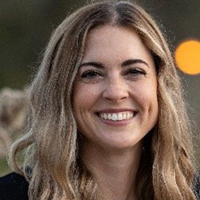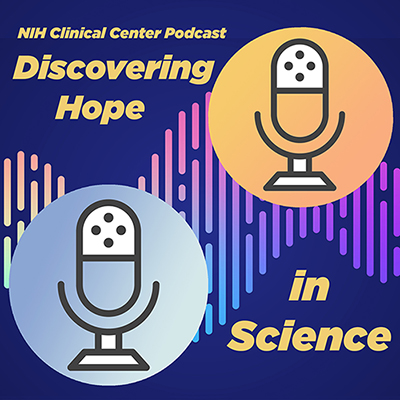[Background Music]
DR. KATHERINE MAKI: All of these different you know astronauts, pilots, fatigue, you want them to have high vigilance. Every single time I thought it was going to be a heart person, and everybody had sleep problems. So, I think as we learn more of sleep and human health, it's not only the amount of sleep you get but the timing of sleep and how consistent you are with your sleep patterns.
[Background Music]
NARRATOR: From the National Institutes of Health Clinical Center, this is Discovering Hope in Science.
JANICE DURAN: My name is Janice from the Office of Communications and Media Relations, and I'll be your host today. In today's episode, we are going to talk about the published article entitled Sleep, Time and Space Fatigue and Performance Deficits and Pilots, Commercial Truck Drivers and Astronauts. And, I'm very excited to have the author, Dr. Katherine Maki here with us today. Hi Dr Maki.
MAKI: Hi, thank you for having me today.
DURAN: Thank you for being here. Could you tell us a little bit more about your published article and your findings?
MAKI: Absolutely, so I was brought on to work on this review by Dr. Anne Fink along with Dr. Terri Weaver so, they're both experts in sleep and sleep apnea which is a sleep disorder breathing that's really common in Americans. We were working on a special issue for Dr. David Dinges, who was one of these pioneers in sleep performance and fatigue, and he developed what's called the psychomotor vigilance test which is kind of an objective measure of sleep and attention and performance that we really highlight in this article.
We focused on occupations that really require sustained vigilance and high performance like astronauts, pilots and truck drivers. What we found was that in a lot of these occupations that require high attention, that under seven hours of sleep, which is the recommended amount of sleep someone gets per day. That was really common, especially in astronauts, which has been kind of reported anecdotally because you don't really have markers of day or night.
So, we did confirm those findings, but then we also saw that when people had early shift start times, they also had really reduced amount of sleep. So, shift time really mattered, and then across studies a sign of reduced performance on that psychomotor vigilance test, the one that I mentioned before which is that objective measure of sleep, that was associated with shorter sleep times which was kind of expected but also when someone had the early morning start times, longer duration of being awake during their work shift, but also higher reported fatigue which also is pretty expected. So, I think this really kind of highlights the importance to kind of continue with outreach and policy work to help with sleep health in these populations; because all of these different you know astronauts, pilots fatigue you want them to have high vigilance, high performance, high reactivity because their jobs are really, really, important for their performance.
DURAN: Why is this research or finding important, and how will this impact the health of Americans?
MAKI: Well, I can talk about this forever, but I think this really kind of adds to the growing body of knowledge of how important sleep health is. And so, I was excited to see as both a cardiac nurse in my previous life, but also a sleep researcher, that the American Heart Association added sleep to life's essential eight, which is their recommended cardiovascular risk reduction behaviors.
And so, we can see that objective performance and reaction times can really suffer when you're not getting the sleep so you are not feeling great, but it also can affect your job as well. Which is, I think, something that's really important. The data that we found that linked early-shift-work starting times but also sleeping during the day, which is kind of out of sync with our normal body rhythm, which is called our circadian rhythm. That's a highlight of being really important in addition to just the sleep length.
And that's something that's a really important to our branch, we've been really focusing on a lot about it. And one of my colleagues actually recently published a paper, her name is Dr. Jen Barb, and it was on the sleep regularity index, and that when people have less consistent sleep and awake times, they are at a higher rate of relapse after treatment for alcohol use disorder. So, it's not just job performance things but other kind of health behaviors can be affected as well. So I think as we learn more of sleep and human health, it's not only the amount of sleep you get, but the timing of sleep and how consistent you are with your sleep patterns.
DURAN: If you had one thing you'd like the public to know from your research what would that be?
MAKI: That health behaviors are really important. In my research, I focus on different types of health behaviors like stress and sleep and how that can relate to the different bacterial communities in your body. So, I focus on the oral and the gut microbiome or the bacteria that live in your mouth in your gut. How those different bacterial communities can signal to your brain. And so, I think that kind of understanding how changes in stuff like sleep, sleep timing, sleep behaviors can really affect many things including your health and how you feel, could be really important and hopefully kind of give us some ideas of different biomarkers that I hope to study in future research.
DURAN: Thank you for just talking to us about the wonderful research you're doing at the Clinical Center.
MAKI: Thank you for having me today.
DURAN: Thanks for listening to Discovery and Hope and Science. View more episodes.
![]() Sign up to receive email updates for NIH Clinical Center Podcast
Sign up to receive email updates for NIH Clinical Center Podcast



